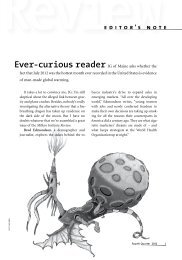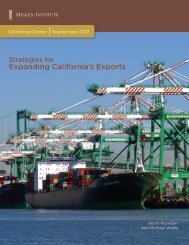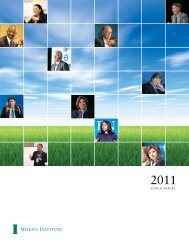The Rise and Fall of the U.S. Mortgage and Credit ... - Milken Institute
The Rise and Fall of the U.S. Mortgage and Credit ... - Milken Institute
The Rise and Fall of the U.S. Mortgage and Credit ... - Milken Institute
Create successful ePaper yourself
Turn your PDF publications into a flip-book with our unique Google optimized e-Paper software.
<strong>The</strong> United States should seriously consider more dramatic consolidation <strong>and</strong> streamlining to reduce <strong>the</strong> number<br />
<strong>of</strong> financial regulatory agencies <strong>and</strong> separate licenses required by financial institutions to provide <strong>the</strong>ir services<br />
nationwide. Creating a greater regulatory focus on preventing a systemic crisis requires such consolidation to<br />
achieve a more uniform <strong>and</strong> broader degree <strong>of</strong> regulatory oversight.<br />
Every country regulates banks, but what is a bank?<br />
A bank is defined legally as a firm that makes commercial <strong>and</strong> � Banks not only need to be<br />
industrial (i.e., business) loans, accepts dem<strong>and</strong> deposits, <strong>and</strong><br />
<strong>of</strong>fers deposits insured by <strong>the</strong> FDIC. But today, in <strong>the</strong> United adequately capitalized to<br />
States, if one examines <strong>the</strong> balance sheet <strong>of</strong> all banks, one<br />
would find that <strong>the</strong> legally defined bank is a relatively small<br />
curtail excessive leverage,<br />
component <strong>of</strong> <strong>the</strong> larger entity. Bank activities now extend but to also have sufficient<br />
far beyond <strong>the</strong>se three services. <strong>The</strong>y provide many different<br />
types <strong>of</strong> loans, <strong>of</strong>fer uninsured deposits, issue different types<br />
liquidity <strong>and</strong> longer-term<br />
<strong>of</strong> securities, invest in different types <strong>of</strong> securities, <strong>and</strong> engage liabilities in <strong>the</strong> event <strong>of</strong> a<br />
in different types <strong>of</strong> <strong>of</strong>f-balance-sheet activities.<br />
Today banks must underst<strong>and</strong> <strong>and</strong> manage more complex<br />
risks—<strong>and</strong> bank examiners <strong>and</strong> supervisory authorities must<br />
widespread flight to safety.<br />
similarly be adequately skilled to fulfill <strong>the</strong>ir oversight responsibilities.<br />
In <strong>the</strong> wake <strong>of</strong> <strong>the</strong> financial crisis, many more banks <strong>and</strong> even nonbank financial institutions have come to better<br />
appreciate that deposits are a relatively reliable <strong>and</strong> low-cost source <strong>of</strong> funds. Because <strong>the</strong>y had been relying<br />
heavily on short-term borrowings or security issuance to fund short-term cash needs, some financial firms found<br />
<strong>the</strong>mselves scrambling to acquire <strong>and</strong> <strong>the</strong>n hoard cash to cover <strong>the</strong>ir operating expenses. Even some investment<br />
banks that are transforming <strong>the</strong>mselves into banks have come to appreciate <strong>the</strong> advantages <strong>of</strong> deposits. <strong>The</strong>re<br />
is a new appreciation that banks not only need to be adequately capitalized to curtail excessive leverage, but to<br />
also have sufficient liquidity <strong>and</strong> longer-term liabilities in <strong>the</strong> event <strong>of</strong> a widespread flight to safety. It has also<br />
become clear that <strong>of</strong>f-balance-sheet activities need to be more carefully monitored <strong>and</strong> controlled.<br />
Beyond <strong>the</strong>se specific issues, <strong>the</strong>re is <strong>the</strong> question <strong>of</strong> what activities are allowable for banks <strong>and</strong> which<br />
organizational form (i.e., a holding company, with separately capitalized subsidiaries, or directly in a bank or <strong>the</strong><br />
subsidiary <strong>of</strong> a bank) is most appropriate. <strong>The</strong> regulatory challenge is to decide on <strong>the</strong> appropriate composition<br />
<strong>of</strong> <strong>the</strong> on- <strong>and</strong> <strong>of</strong>f-balance-sheet activities allowed by banks to ensure adequate liquidity, capital, <strong>and</strong> duration<br />
match <strong>of</strong> assets <strong>and</strong> liabilities. A balance must be struck to allow banks to be competitive while ensuring <strong>the</strong>y<br />
operate prudently. Greater transparency <strong>and</strong> more reliance on market discipline are also essential.<br />
37















